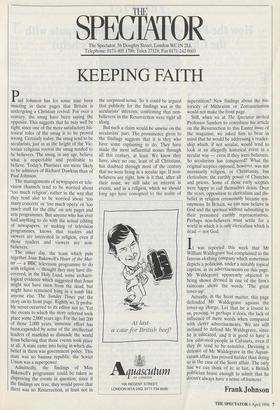SPECTATOR
The Spectator, 56 Doughty Street, London WC1N 2LL Telephone: 0171-405 1706; Telex 27124; Fax 0171-242 0603
KEEPING FAITH
Paul Johnson has for some time been insisting in these pages that Britain is undergoing a Christian revival. For over a century, the smug have been saying the opposite. This suggests that he may well be right, since one of the more satisfactory his- torical roles of the smug is to be proved wrong. Certainly today, the smug tend to be secularists, just as at the height of the Vic- torian religious revival the smug tended to be believers. The smug, in any age, believe what is respectable and profitable to believe. Today's Pharisees are more likely to be admirers of Richard Dawkins than of Paul Johnson.
The managements of newspapers or tele- vision channels tend to be worried about `too much religion', rather in the way that they tend also to be worried about 'too many concerts' or `too much opera' or 'too much stuff for the elite' on arts pages and arts programmes. But anyone who has ever had anything to do with the actual editing of newspapers, or making of television programmes, knows that readers and viewers are interested in religion, even if those readers and viewers are non- believers.
The other day, the team which puts together Joan Bakewell's Heart of the Mat- ter — a BBC television programme to do with religion — thought they may have dis- covered, in the Holy Land, some archaeo- logical evidence which suggested that Jesus might not have risen from the dead, but might have remained lying in a tomb like anyone else. The Sunday Times put the story on its front page. Rightly so. It proba- bly never occurred to its editor not to. Yet the events to which the story referred took place some 2,000 years ago. For the last 200 of those 2,000 years, immense effort has been expended by some of the intellectual leaders of mankind to dissuade the world from believing that those events took place at all. A state came into being in which dis- belief in them was government policy. This state was no banana republic: the Soviet Union was a superpower.
Admittedly, the findings of Miss Bakewell's programme could be taken as disproving the events in question, since if the findings are true, they would prove that there was no Resurrection, at least not in the corporeal sense. So it could be argued that publicity for the findings was in the secularists' interests; confirming that non- believers in the Resurrection were right all along.
But such a claim would be unwise on the secularists' part. The prominence given to the findings suggests that it is they who have some explaining to do. They have made the most influential noises through all this century, at least. We know they have, since no one, least of all Christians, has doubted through most of the century that we were living in a secular age. If non- believers are right, how is it that, after all their noise, we still take an interest in events, and in a religion, which we should long ago have consigned to the realm of superstition? New findings about the his- toricity of Mithraism or Zoroastrianism would not make the front page.
Still, when we at The Spectator invited Professor Sanders to contribute his article on the Resurrection to this Easter issue of the magazine, we asked him to bear in mind that he would be addressing a reader- ship which, if not secular, would tend to look at an allegedly historical event in a secular way — even if they were believers. So secularism has conquered? What the original sceptics opposed, however, was not necessarily religion, or Christianity, but clericalism: the earthly power of Churches and priests. Some of those early sceptics were happy to call themselves deists. Over the years, opposition to clericalism and dis- belief in religion erroneously became syn- onymous. In Britain, we can now believe in God and the spiritual without submitting to their presumed earthly representatives. Perhaps non-believers must settle for a world in which it is only clericalism which is dead — not God.
It was reported this week that Mr William Waldegrave had complained to the famous clothing company which sometimes depicts a politician, under a suitably topical caption, in its advertisements on this page. Mr Waldegrave apparently objected to being shown dressed in one of the firm's raincoats above the words: 'The great cover-up'.
Actually, in the Scott matter, this page defended Mr Waldegrave against the cover-up charge. Let that be a lesson to us, proving, as perhaps it does, the lack of influence of mere words when compared with clever advertisements. We are still inclined to defend Mr Waldegrave, since he is educated, and it is good to have a few educated people in Cabinets, even if they do tend to be sensitive. Devising a defence of Mr Waldegrave in the Aquas- cutum affair has proved harder than doing so in the case of the Scott affair. The only line we can think of is: at last, a British politician brave enough to admit that he doesn't always have a sense of humour.
Frank Johnson


























































 Previous page
Previous page